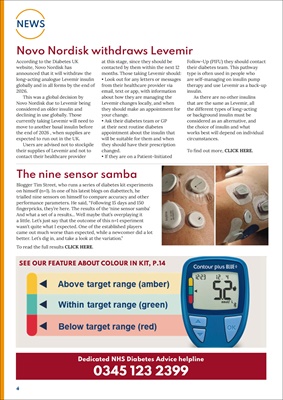
4
NEWS
Novo Nordisk withdraws Levemir
According to the Diabetes UK
website, Novo Nordisk has
announced that it will withdraw the
long-acting analogue Levemir insulin
globally and in all forms by the end of
2026.
This was a global decision by
Novo Nordisk due to Levemir being
considered an older insulin and
declining in use globally. Those
currently taking Levemir will need to
move to another basal insulin before
the end of 2026 , when supplies are
expected to run out in the UK.
Users are advised not to stockpile
their supplies of Levemir and not to
contact their healthcare provider
at this stage, since they should be
contacted by them within the next 12
months. Those taking Levemir should:
• Look out for any letters or messages
from their healthcare provider via
email, text or app, with information
about how they are managing the
Levemir changes locally, and when
they should make an appointment for
your change.
• Ask their diabetes team or GP
at their next routine diabetes
appointment about the insulin that
will be suitable for them and when
they should have their prescription
changed.
• If they are on a Patient-Initiated
Follow-Up (PIFU) they should contact
their diabetes team. This pathway
type is often used in people who
are self-managing on insulin pump
therapy and use Levemir as a back-up
insulin.
As there are no other insulins
that are the same as Levemir, all
the different types of long-acting
or background insulin must be
considered as an alternative, and
the choice of insulin and what
works best will depend on individual
circumstances.
To find out more, CLICK HERE.
Early detection of T1D matters
Beakthrough T1D is claiming that
some of this year's Nobel Prizes are
recognizing work that is, in several
ways, connected to the charity and
the work that it is doing to cure Type
1 diabetes (T1D) and improve the lives
of those living with it.
The 2024 Nobel Prize in
Physiology or Medicine was awarded
to Victor Ambros and Gary Ruvkun
for the discovery of microRNA and
its role in post-transcriptional gene
regulation. Breakthrough T1D is
currently funding $2.6m in grants
related to exploring the use of
microRNAs as biomarkers of disease
progression and as a therapeutic
target to interfere with the
autoimmunity behind T1D.
In addition, David Baker, a
Breakthrough T1D-funded researcher,
was awarded half the 2024 Nobel
Prize in Chemistry for computational
protein design. Baker's prize
acknowledges his work in discovering
a way to create new proteins that
have never existed before. These
proteins can potentially be used to
treat diseases, make new vaccines,
and perhaps a potential application
to T1D.
www.breakthrought1d.org.uk
The nine sensor samba
Blogger Tim Street, who runs a series of diabetes kit experiments
on himself (n=1). In one of his latest blogs on diabettech, he
trialled nine sensors on himself to compare accuracy and other
performance parameters. He said, "Following 15 days and 150
fingerpricks, they're here. The results of the 'nine sensor samba'
And what a set of a results... Well maybe that's overplaying it
a little. Let's just say that the outcome of this n=1 experiment
wasn't quite what I expected. One of the established players
came out much worse than expected, while a newcomer did a lot
better. Let's dig in, and take a look at the variation."
To read the full results CLICK HERE.
Dedicated NHS Diabetes Advice helpline
0345 123 2399